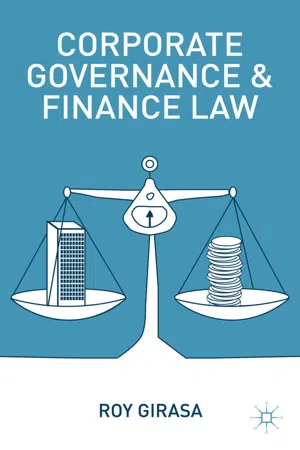Law
Finance Law
Finance law refers to the legal framework that governs financial transactions and activities. It encompasses a wide range of areas, including banking, securities, insurance, and taxation. The primary goal of finance law is to ensure that financial markets operate fairly and efficiently, and that consumers are protected from fraudulent or abusive practices.
Written by Perlego with AI-assistance
Related key terms
1 of 5
3 Key excerpts on "Finance Law"
- eBook - PDF
Private Law
Key Encounters with Public Law
- Kit Barker, Darryn Jensen(Authors)
- 2013(Publication Date)
- Cambridge University Press(Publisher)
For the creation of a comprehensive law of finance there is a need for a synthesis of substantive concepts from private law with regulations and statute created specifically for the financial context. Areas of law such as the law of finance are predicated on this synthesis of fundamental con- cepts and rules created for particular contexts. 7 The law of finance in the UK is a synthesis of substantive law concepts taken from contract law, tort law, property law, criminal law, equity and private international law, 8 with contextual regulation created by the Financial Services Authority (FSA) 9 further to powers granted to it by the Financial Services and Markets Act 2000 (FSMA 2000). 10 6 A good example is P. Birks and R. Chambers, Restitution Research Resource (Oxford: Mansfield Press, 1997), which sought to delineate all of the categories of unjust factor giving rise to claims for unjust enrichment, in spite of the torrent of new doctrines emer- ging in equity. See also G. Samuel, ‘Can Gaius Really be Compared to Darwin?’ (2000) 49 International and Comparative Law Quarterly 297. 7 As is explored in greater detail in Alastair Hudson, The Law of Finance, 1st edition (London: Sweet & Maxwell, 2009), paras. 4–03ff. 8 As identified in ibid., pp. 1–723 (Section A: General Principles). 9 The Financial Services Authority is due to be replaced in 2013 (assuming the Financial Services Act 2012 is brought fully into effect according to the current timetable) by new subsidiary entities of the Bank of England, in particular the Financial Conduct Authority and the Prudential Regulatory Authority. The former will have oversight of conduct of business and the latter micro-prudential oversight of individual financial institutions, with the new Financial Policy Committee holding responsibility for the stability of the financial system. - Janelle Knox-Hayes, Dariusz Wójcik, Janelle Knox-Hayes, Dariusz Wójcik(Authors)
- 2020(Publication Date)
- Routledge(Publisher)
Access to lawyers and the accumulation of assets that enjoy special legal pro-tection lies at the heart of inequality today. Further, the search for more wealth pushes lawyers and their clients to create new assets while externalizing the risks associated with them. In this way, they push the system towards another crisis, which will trigger another regulatory backlash. In this way, private law and public regulation become deeply imbricated in the construction of finance. Two important implications follow. First, for financial relations to scale beyond where mutual monitoring or intermediation by agents who can mutu-ally monitor each other is feasible, it requires formal law backed by coercive state powers. Second, large-scale, complex financial systems are coded in law even in the absence of regulation. Deregulation, or the scaling back of public law interventions, therefore does not create a law-free space. It only expands the scope for private actors to shape financial markets with the private law tools at their disposal. In short, law is in finance (Pistor, 2013a). Finance,s Legal Toolkit This section gives a brief overview of the legal toolkit that is commonly used to forge financial assets. It includes contract law, property and collateral law, trust and corporate law, as well as bankruptcy law. Different legal systems have developed their own variants of these legal tools and not all can be found everywhere; trust law, for example, is a genuinely common law ‘invention’. Still, for the purposes of showing how law is the stuff from which finance is made, these variations are not crucial. At the most basic level, the legal toolkit enhances the probability that a given commitment will be enforced. This is what contract law , as opposed to private agreements, is all about. Parties can enter into any agreement, but not all agreements are enforceable in a court of law backed by the state’s coercive powers.- eBook - ePub
- R. Girasa(Author)
- 2013(Publication Date)
- Palgrave Macmillan(Publisher)
CHAPTER 1 Overview of the Law of FinanceIntroductionLaw has been described as a seamless web that for convenience and specialization is divided into a number of categories. Thus, students taking an introductory course in the study of law may be taught that the subject is divided into the categories of public or private; substantive or procedural; civil or criminal; national, regional, or international; and other artificial distinctions. Persons who have studied law for many decades see its unifying aspects as well as the subtleties of its categories. Just as a physician may specialize in one category of the human body, most lawyers tend to become competent in one particular area of the law such as criminal law, tort law, or corporate law. Nevertheless, in today’s complex society an attorney must also understand the interrelationship of legal aspects outside of their competence. Corporate attorneys in the past concentrated on legal aspects of mergers and acquisitions, reorganizations, duties of corporate directors and officers, contractual issues relating to public and private offerings, and the many other substantive areas in which executives are engaged. However, today they must become aware of the possible criminal and tortious behavior of their clients.The scandals of the past decade, which have been discussed exhaustively ad nauseam in corporate offices by corporate attorneys, and in accounting firms, led to the passage of significant congressional enactments that affect finance. These include the Sarbanes-Oxley Act of 2002 and the Dodd-Frank Act of 2010. When this author attended law school in the late 1950s, criminal law was given very low priority, consisting of a two-credit course that mainly covered acts of violence by poor individuals living in slum-like conditions. There was no discussion of white-collar crime inasmuch as such behavior almost never resulted in prosecution and/or imprisonment. The enactment of the Sarbanes-Oxley Act, with its very significant provisions of 20-year imprisonment for certain offenses, and the conviction of Enron’s chief executive officer (CEO) and other senior executives who did receive or faced such terms, finally caught the attention of corporate executives.
Index pages curate the most relevant extracts from our library of academic textbooks. They’ve been created using an in-house natural language model (NLM), each adding context and meaning to key research topics.


